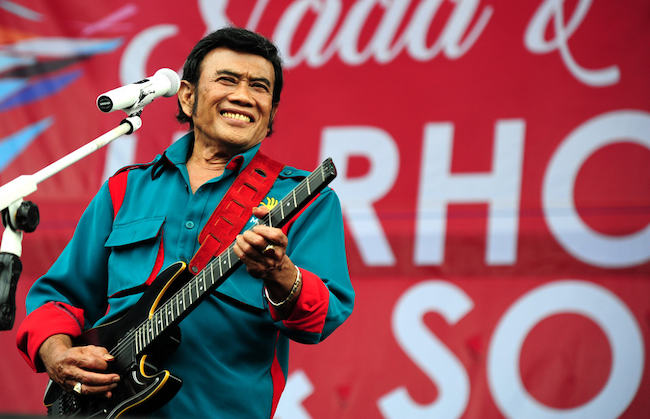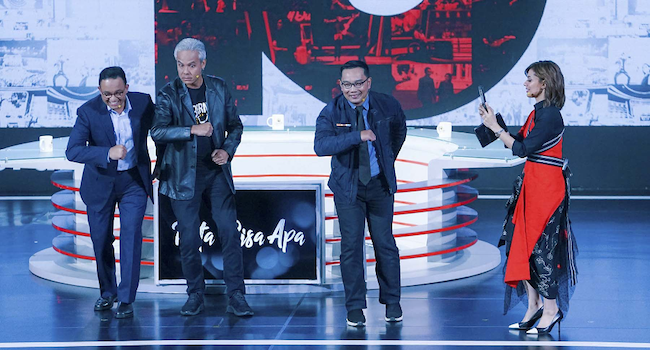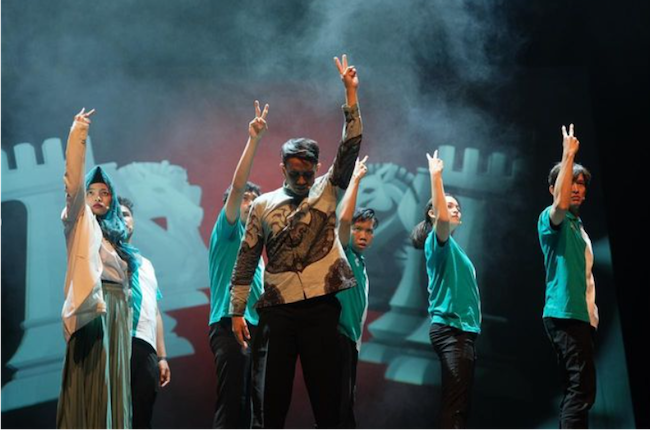The replacement of dangdut with TikTok dances in the 2024 elections heralds a massive demographic shift in Indonesian political campaigning and beyond
Victoria Winata & Monika Winarnita
All three 2024 Indonesian presidential candidates – Anies Baswedan, Ganjar Pranowo, and Prabowo Subianto – used pop music and dance in their campaigns, but it was really Prabowo who danced his way to victory. It was his signature gemoy (cute) dances that proved the most popular and iconic out of the three. His official campaign song, Oke Gas 2, went viral on TikTok and Prabowo regularly danced to it in front of a mass audience.
Dance has long been a fixture in Indonesian presidential campaigns. Dangdut has traditionally been the dance of choice since the Golkar Party incorporated it into their campaigns in 1971.
Dangdut music and dance first emerged in Jakarta. In the early 1970s it was shaped and popularised by the musician and performer Rhoma Irama, known as ‘Raja Dangdut’ (the ‘King of Dangdut’). Although musically complex – with its layers of Arabic, Malay, Indian and local folk influences – dangdut is often associated with the lower classes and seen to appeal to the rakyat biasa (ordinary people).
Evolving throughout New Order, reformasi and present-day Indonesia, perceptions of dangdut – and who is considered to be the rakyat biasa – have shifted significantly.
Dangdut’s dominance
From themes of love to critiques against social inequality, Irama’s music contains heavy, populist messages and lyrics about everyday life and struggles that appealed to the masses, and lower classes especially. His style of dangdut, lyrics and musicality clashed with the Indonesian elite’s (specifically, politicians and the urban upper middle class) version of the dance form.
In the late 1970s, state media and popular magazines – read by mostly middle and upper class Indonesians – featured stories about dangdut but did not include popular dangdut figures. Irama was banned from TVRI because his songs contained messages critiquing Suharto’s regime. Across the 1980s and 1990s, conflicting perceptions of dangdut as both a political platform and vehicle for dissent continued to emerge. Indonesian elites publicly expressed their appreciation for dangdut as an ‘equaliser of the masses’ – recognising its political usefulness. In reality, the wealth of many popular dangdut stars pointed to a wider gap between the dangdut elite and their fans.
Dangdut continues to be seen as a tool to galvanise the masses, with Indonesia’s political elite shaping its image according to their interests. Rhoma Irama has made several forays into politics himself. In 1977, he campaigned successfully for Partai Persatuan Pembangunan (United Development Party, PPP) and, in 2015, he founded Partai Islam Damai Aman (Peaceful and Safe Islamic Party).
In their study of the 2019 presidential election, Metha Madonna and Arya Dillah found that dangdut was very useful in drawing in large audiences, whether or not they were aware they were attending a political campaign.

In 2019, Rhoma Irama performed for Prabowo and composed a song for him and Prabowo’s vice-presidential running mate Sandiaga (‘Sandi’) Uno, titled Padi. At their campaign, Sandi played electric guitar and danced alongside Rhoma and their audience.
In the recent 2024 election campaign, there was, however, a noticeable shift. The so-called rakyat biasa have been overtaken by another group: anak muda (youth). Dangdut is still used in parts of the campaign such as at the PDIP mass rally in Semarang, Central Java, when King Nassar invited Megawati Sukarnoputri and her daughter, Puan Maharani, to dance and sing with him. Nevertheless, TikTok dances emerged as newer, trendier political tools.
The replacement of dangdut with TikTok-style dances coincides with Indonesia’s demographic shift. Dangdut, now seen as kampungan (meaning essentially rural or ‘uncool’), has been pushed aside in favour of music and dance seen as cool and cosmopolitan to represent Indonesia’s largely middle class, urban youth.
Tech-savvy and politically active youth are influential in spreading campaign messages and information, which makes them so important for political parties to pay attention to. The youth demographic – comprising Gen Z and Millenials – made up over 50 per cent of voters in 2024. While the 2014 and 2019 elections were infamous for hoaxes and black campaigns, the 2024 election became known for its gimmicks as Anies Baswedan, Ganjar Pranowo and Prabowo Subianto made far-reaching efforts to woo the youth.
Dance, politics and gender
Dangdut as an industry is dominated by men; women are often excluded or stigmatised. Rhoma Irama’s audiences in the 1970s and 80s were almost entirely male. In performing dangdut dance, women have been subject to bans and restrictions for what they can wear and which parts of their body they can show.
Indonesia’s controversial 2008 anti-pornography bill made well-known female dangdut singers, such as Inul Daratista and her drilling dance, less visible in media and coverage of large public performances, including the election campaigns. However, dangdut didn’t disappear altogether from these events.
Female political elites have been invited to participate in dangdut performances but not as performers themselves. This includes Megawati and her daughter Puan, who – as mentioned – danced at several Ganjar Pranowo campaign events in 2024. Ganjar’s campaigns only employed female dancers for larger, more sensational performances such as their Tarian Kolosal at Gelora Bung Karno Stadium in Jakarta. Megawati and Puan’s style of dancing, and the dances used at PDIP campaigns, were more aligned with folk-style movements rather than dangdut.
Women performing during election campaigns are most often seen in larger group dances rather than individual stage performers. The incorporation of Balinese dance in the Tarian Kolosal, for example, was used to symbolise PDIP’s enduring cultural and historical ties to the island, which has always been a PDIP stronghold. The involvement of female dancers in state performances does not elevate the status of women per se, but instead serves a political purpose with women engaged as cultural or state symbols.
The rise of TikTok dances
Indonesia is listed as the country with the fourth largest number of social media users and is home to the world’s second largest group of TikTok users, making TikTok a critical platform for Indonesian politicians to reach voters.
In Indonesia, elections are as much a personality contest as they are debates over policy. Politicians must distinguish themselves from one another; money and policies are not enough to garner votes. Anies, Ganjar and Prabowo have engaged in a variety of tactics in the past year to ‘market’ themselves to Indonesians. Anies gained a reputation as a father figure and honorary K-Pop idol through his TikToks, including popular series Tanya Abah (Ask Dad) where he offers fatherly advice. Ganjar became known for his bold fashion choices at presidential debates, with his signature campaign bomber jacket. Prabowo, meanwhile, reinvented himself from military strongman to ‘cute grandpa’ and succeeded in attaining 58 per cent of the nation’s vote. He also had 36-year-old Gibran Rakabuming Raka, Jokowi’s eldest son, as a running mate and representing anak muda.
The music video for Oke Gas 2 combines dance and catchy tunes with political campaigning. It strongly promotes Prabowo and Gibran’s free lunch program, intending to provide free lunch for students and pregnant women, and milk for toddlers. Bobby Nasution, Gibran’s brother-in-law and current mayor of Medan, can also be seen dancing in support of Prabowo–Gibran. The video is heavy in political promotion, but balanced with footage of a dancing crowd, smiling and having fun.

Najwa Shihab, an influential journalist who is very popular amongst Indonesia’s youth, often combines games and pop culture – including dancing – and political discussion to engage her viewers. In February 2020 she challenged Anies, Ganjar and former Governor of West Java Ridwan Kamil to a TikTok dance competition. The video went viral, earning more than 10 million views on YouTube.
Programs such as Najwa’s greatly help young viewers stay politically aware and engaged. However, they also pose the risk of discouraging critical thinking about the candidates’ track records, which are potentially buried under the frivolity of TikTok dances and pop music. All three candidates have been implicated in human rights violations: in the 2017 Jakarta gubernatorial race, Anies benefited from racist sentiment against his rival Basuki Tjahaja Purnama (‘Ahok’), who was Jakarta’s first ethnic Chinese governor; Ganjar was responsible for a highly controversial mining project in Wadas, Central Java, which violated the land rights of its residents; Prabowo has a long list of human rights abuses to his name, including the kidnapping and torturing of activists from 1998 and violence in East Timor.
Studies show that despite Indonesia’s attempts to reform its education system through the Kurikulum Merdeka (Freedom Curriculum), critical thinking is still limited in Indonesian classrooms. Despite changes brought about by reformasi, Indonesia's education system as a whole has failed to encourage curiosity or comprehensive debate in classrooms. Teachers instead rely on quizzing students for correct or incorrect answers.
Tools for youth empowerment
At the same time, a large number of Indonesia’s youth are politically engaged and critical. Brothers Andovi and Jovial da Lopez, two well-known influencers in Indonesia, have recently staged a musical, Polarisasi, in response to the 2024 election. The lyrics from its opening song Hati-Hati Polarisasi encourage voters to research their candidates in-depth and not depend solely on social media content for their political education.

Upbeat, youth-led and skilfully choreographed, Polarisasi encourages young voters to think critically about the presidential election. The Da Lopez brothers are not alone in using music and performance to challenge the political elite. Among many others, young musicians who advocate for socio-political issues include Endah N Rhesa, Kai Mata, and Guritan Kabudul. Their critique of political elites also demonstrates how definitions of Indonesia’s rakyat biasa are often shifting and contradictory. It is clear that both the actual youth and political elites have their own projections of who counts as the rakyat biasa, and that the real, ‘ordinary’ people do not always agree with them.
Dance and social media give Indonesian youth the power and influence to engage with politics. Dance is not only a way for politicians to distinguish themselves, but for youth to creatively express their identity.
Victoria Winata is a writer, artist, and current co-coordinator of AIYA (Australia–Indonesia Youth Association) Victoria’s socioculture division. Dr Monika Winarnita is a lecturer in Indonesian Studies at the University of Melbourne and is a current Convenor for the Indonesia Forum.











